In Kieron Gillen’s talk on Alan Moore’s and Dave Gibbons’ Watchmen, Gillen emphasizes themes of time and cyclicality present in Moore’s graphic novel. Temporal symbolism recurs in everything from the Doomsday clock interstitials between chapters to Rorschach’s ever-shifting face to Dr. Manhattan’s past as the son of a watchmaker. Gillen, working alongside artist Jamie McKelvie, colorist Matt Wilson, and letterer Clayton Cowles, emphasizes similar themes of cyclicality in the Eisner-nominated series The Wicked + The Divine.
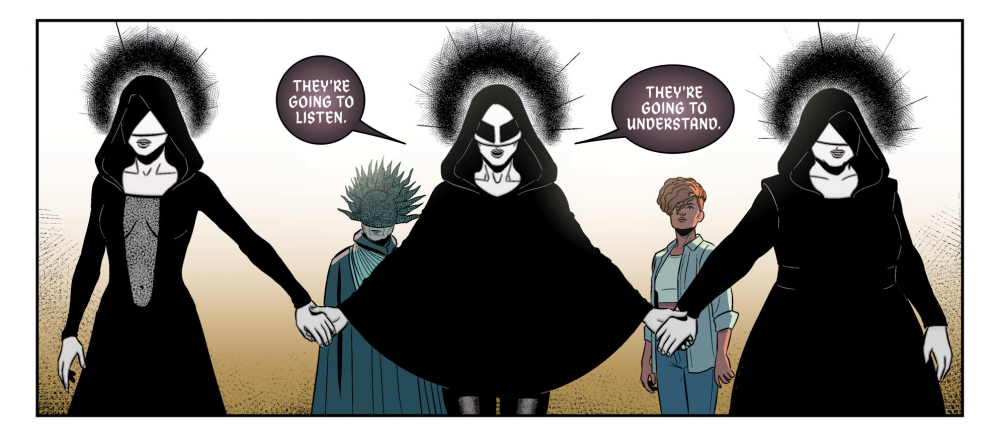
The work is shaping up to be a structural masterpiece in the vein of Watchmen and the conclusion to the series’ second arc, Fandemonium, releases next week. In honor of this, I’d like to take a moment to explore some of the recurring elements of the series that reexamine where we’ve been and clue us into the future of the series.
First Act
The premiere arc of the series is lovingly titled The Faust Act. In it, the team establishes Laura, who is our muggle POV character, and the majority of the gods present for the 2014 Recurrence. Ultimately, we see one of those gods abruptly exit stage left. The source of this arc’s name comes from Christopher Marlowe’s 16th century play The Tragical History of the Life and Death of Dr. Faustus. In the work, Faustus makes a deal with the devil Mephistopheles: infinite knowledge in exchange for eternal damnation. Throughout the play, Faustus reveals himself to be hapless despite receiving near-infinite power. Mephistopheles dances around the philosophical questions that Faustus poses to him and Faust spends the rest of his time conducting pointless experiments. He is ultimately damned despite begging for salvation.
This basically summarizes Lucifer’s arc in The Faust Act. She receives the gift of godhood and then wastes it by wasting two assassins who couldn’t kill her anyways. Ultimately, she is executed despite begging for forgiveness. While it is clear that Luci killed her assassins, debate has raged within and outside of the text as to whether or not Luci killed the judge that tried her for her crimes. After issue ten revealed that there was no link between the death of the judge and the attempt on Luci’s life, I decided to go back and look for some textual (or should it be panel) evidence that points to the identity of the judge’s killer. I keep coming back to these two pages:
I don’t believe that the WicDiv team is making this connection for giggles. I think Luci killed the judge. In issue 10, David Blake, the organizer of a Pantheon studies convention called Ragnarock, tells Laura that “we’ll never know for sure” who committed the crime, and I’m inclined to believe that that means Team WicDiv won’t ever give us a firm answer to the question. They want us to speculate, and it would certainly fit the Faustian trope if Luci were the catalyst for her own demise. The excerpted page from the first issue symbolizes her sealing her damnation, and the page from the fifth issue represents her begging for salvation.
Why would she do this to herself? Well, throughout the series, we see several gods perform. Amaterasu, Baphomet, The Morrigan, and most recently, Urdr. We never see Luci perform, but during her imprisonment, she feeds Laura this line:
What if Luci’s tragic story was her performance, and The Faust Act her stage? Her guiding principle throughout the comic is freedom, but at the end of the first issue, she allows herself to be arrested. There’s no reason why a few human police should be able to arrest a miracle maker. Later on, Luci demonstrates as much by melting through her holding cell as though it were made of wax. Luci is in control of everything throughout The Faust Act. Everything except for the inevitability of her death.
When Luci becomes a god, the spiritual guide of the gods, Ananke, tells Luci that she will be dead within two years. All the gods will. That’s the cruel joke of the Recurrence: you get the freedom to do anything except stave off your rapidly approaching death. It’s the ultimate encroachment upon one’s freedom, and the only way Luci can see to cheat the inevitable and reclaim that freedom is to die on her own terms. Getting arrested, killing the judge, breaking out of prison, and getting killed were the acts of Lucifer’s performance, and it inspires gods and men alike.

Speaking of cruel jokes, this is the cover of issue one transitioning into the issue’s first page…MCKELVIEEEEEEEEEEE!
Whose story?
Towards the end of The Faust Act, Luci gives Laura a cigarette. After Luci’s death, Laura snaps her fingers like a god, and is amazed to watch the cigarette light. Throughout the second arc, we’ve watched Laura snap her fingers constantly, trying to recreate the magic and take her place as a god. However, when Cassandra is revealed to be the twelfth god, that door is closed to Laura forever. It seems, as this interstitial puts it, that The Wicked + The Divine is:
One of the most common criticisms I’ve heard levied against Wic+Div is that Laura, ostensibly the series’ main character, doesn’t actually get much to do. She’s standing, dumbfounded, in the spotlight while all the gods are throwing fireballs and resurrecting people in the wings behind her. To some extent, this is true. Laura isn’t a protagonist in this series like Dream was in The Sandman. However, this is also the point. She’s not there to inspire. She’s there to be inspired. The first two arcs of the story take place over six short months, and Laura is already a dramatically different person. Check out these two layouts:
In the first chapter, Laura is starstruck. Luci is a capital G-O-D god. Laura looks up at Luci as she takes her hand and is led into a world beyond her and the reader’s imagination. She’s dressed up as Amaterasu and actively seeks to become someone else. By the time the fifth issue rolls around, Laura’s no longer hiding. She isn’t playing at being a god. She’s a friend of the gods. Instead of looking up to them, she sees their flaws, and thus is portrayed above Luci.
At one point, Baal makes a telling statement:
The gods don’t change the world. They only appear every 90 years and disappear after two. The gods empower regular people like Laura, and people like her–people like us change the world. Laura doesn’t “do” much because she’s still in the process of being born. As long as the gods are here, her actions will always be visually trumped by the flashy powers of the Pantheon. However, even without powers, she’s managed to drive a great deal of the action in the series and inspire a lot of people. Even David Blake, who once said that she’s “learned so little that [her] opinion is pretty much void,” turns around by the end of the second arc and admits that he was wrong.
Gillen’s writer’s notes on the first issue serve as a piece of extratextual evidence that supports this reading of Laura. In his blog post, he writes that Laura’s name is inspired by the eponymous Bat For Lashes song.
Some choice lines include:
“Your heart broke when the party died.”
“You’re more than a superstar.”
“You’ll be famous for longer than them.”
People may hate on Laura, but she is the key to understanding The Wicked + The Divine because she’s going to be the last woman standing at the end of the series. She didn’t inherit the spirit of the gods. She’s inheriting something better: the Promethean gift of their knowledge. What’s left to be seen is what she does with that gift, but I have some ideas…
Once again, we return…
Ananke utters the same words at the end of the 1920s recurrence and as Cassandra takes her place as Urdr, the last god needed to complete the 2014 pantheon. Ananke is focused on the positive elements of cyclicality in these scenes, looking forward to the future and the beginning of the Recurrence cycles. She neglects to mention the end of the statement.
Once again we return
to this.
In two years, her children will be dead. Again. She doesn’t say it, but the sentiment is revealed on her face as she watches the last of the 1920s pantheon die. Interestingly, although Ananke is the constant and undying element of necessity that persists between pantheons, she seems to have aged dramatically over the past 90 years. Now granted, she wasn’t exactly starring in Dove commercials in 1923 (I can’t think of a contemporary joke, sue me), but the last century seems to have worn her down and given her more wrinkles than the time stream of Looper. She says as much in an interview with Cassandra:
Now, this is pretty foreboding. When Laura visits Valhalla for the first time in issue four, one of the major reasons why the other gods won’t help end Luci’s imprisonment is because it could mean the end of all Recurrences. Forever. As Ananke says:
Superficially, one could say that Ananke fears that humans will literally kill the gods. Now, as has been demonstrated time and time again (bullets curve around gods), this is exceedingly difficult. However, what if humans simply stopped believing in the gods’ ability to inspire? Ananke says that the “inspiration will leave the world forever” without the gods, but can she back up that statement? The years have worn on Ananke and the 2014 Recurrence is not going well. Perhaps the fault for that doesn’t lie with any of the gods. Perhaps mankind simply doesn’t need them anymore. To quote Nietzsche (which is always a good idea, I promise):
“God is dead. God remains dead. And we have killed him. How shall we comfort ourselves, the murderers of all murderers…must we ourselves not become gods…?”
Now, this is the point in the article where analysis-based hypothesizing becomes almost pure extrapolation and guesswork, so be warned. However, I think The Wicked + The Divine is showing us the last Recurrence ever. In Neil Gaiman’s American Gods, the author plays with the idea that gods are powered by the strength of human belief. They exist only as long as people need them to. If Team WicDiv is drawing from this particular school of thought, then we could be witnessing the last recurrence ever because the cycle of rebirth has run out its usefulness. The gods were originally created to “light the spark” that allows mankind to beat back an oppressive darkness and begin the construction of civilization. Civilization was constructed. Civilization has lasted. The recurrence is a cycle, a circle, a set of training wheels for mankind. Now it’s time for them to come off. We are witnessing the end of the era of gods as men and the beginning of the era of mankind as gods. Who might lead mankind towards that era? Why, Laura of course.
Let’s look back at Laura grasping Luci’s hand in issue five:
Michaelangelo’s The Creation of Adam is probably one of the most famous paintings in the world. God, on the right, is about the breathe life into Adam, the first man, on the left. Laura, on the right, gives strength to Luci on the left. Laura is the god in this allusive panel. She is the person, “rare and blessed,” who can hear everything that “all the gods have to say,” which makes her the perfect leader for humanity when they’re gone.
How the Recurrence will end and the identity of the ultimate “darkness” that threatens civilization has yet to be seen, but I’m interested to know what you all think of the postulations above. Let me know in the comments or tweet @waxenwings.
As a final thought and not to take away from the gravitas of this moment, but I think it’s funny that Laura’s still wearing a coat in issue 9 even though it’s almost July. Girl is frigid.



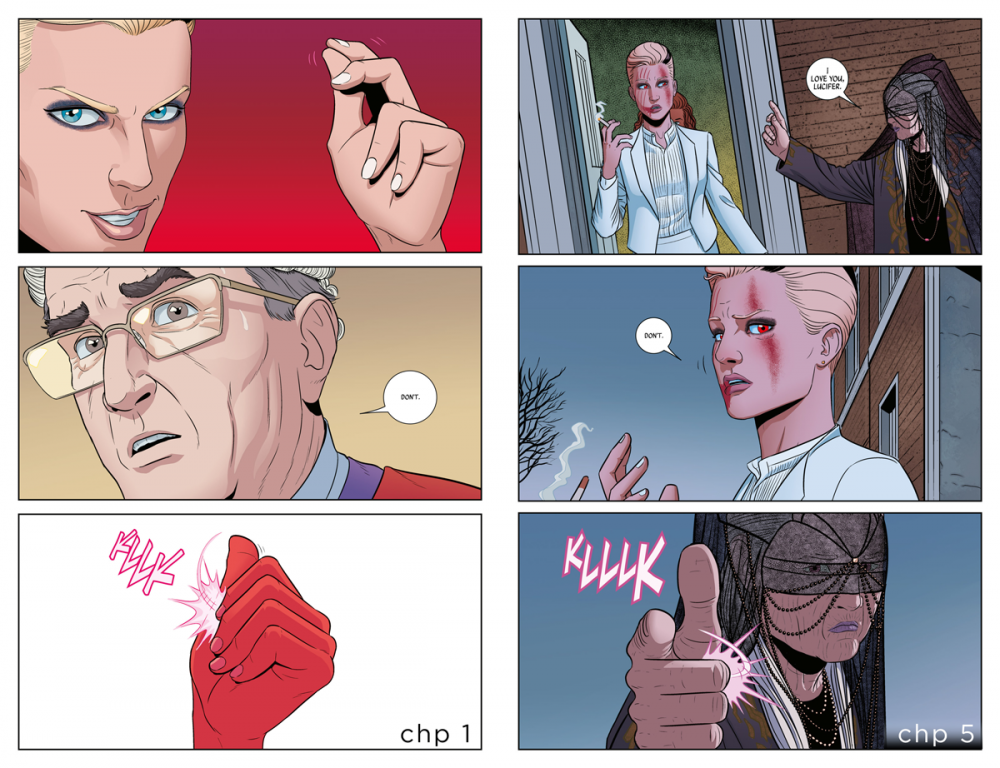
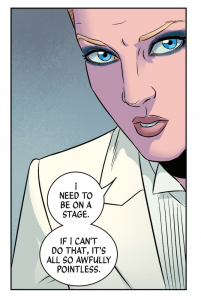
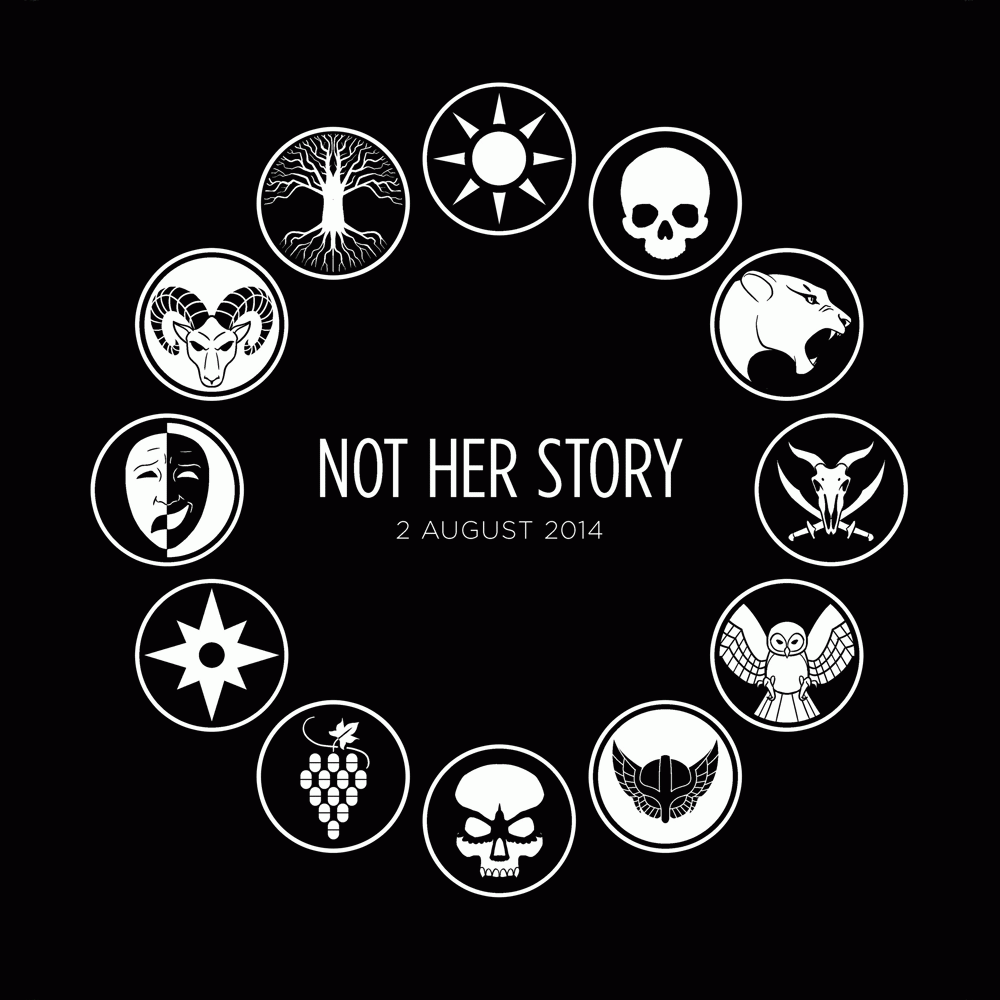

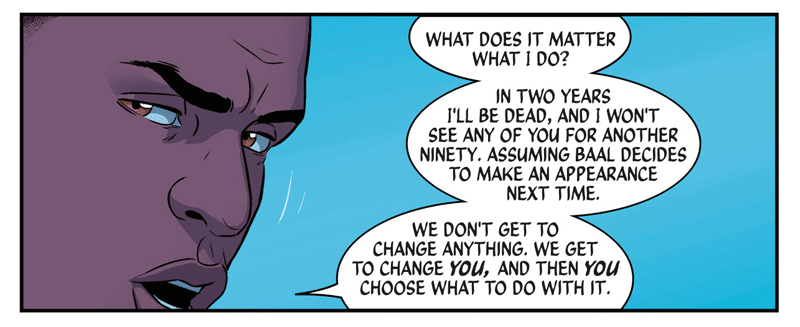
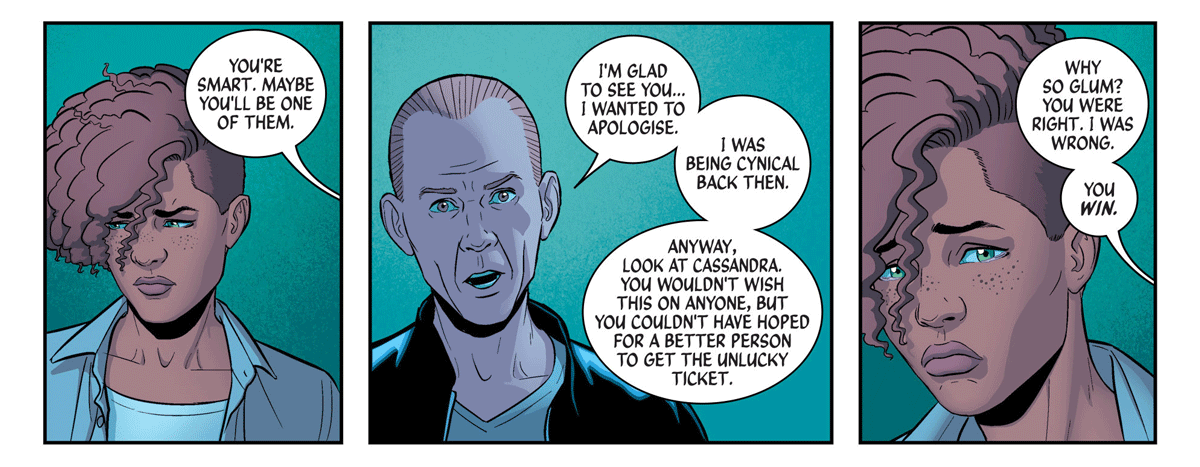
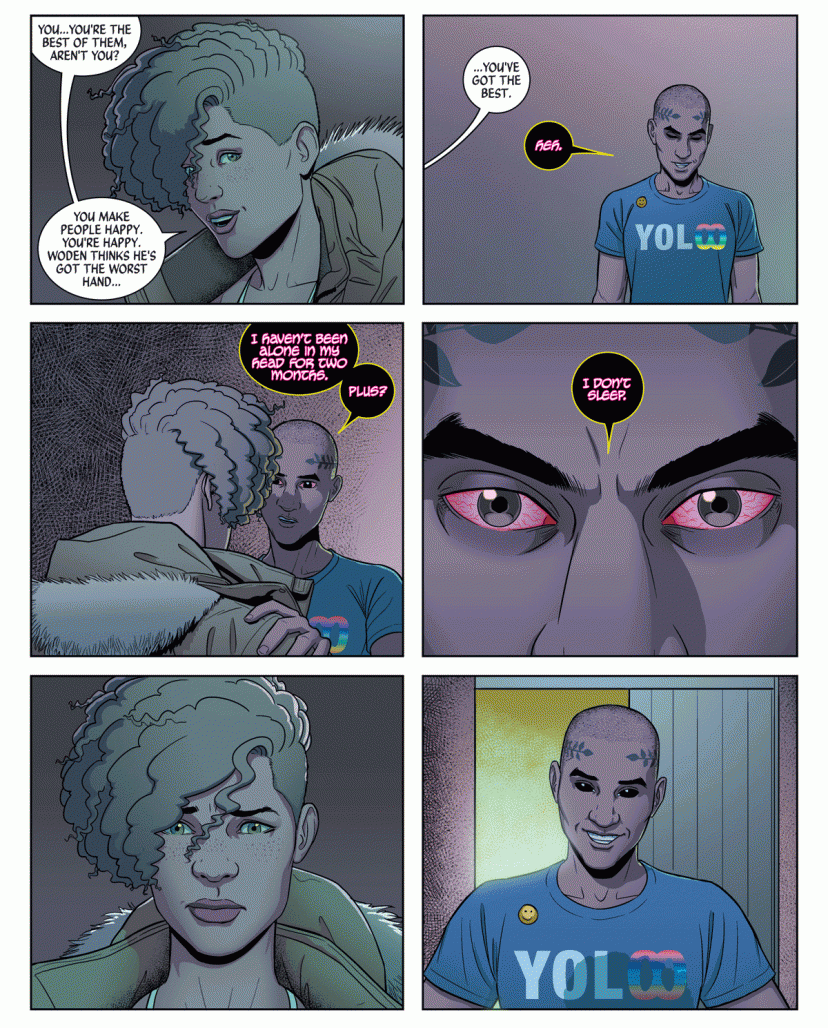
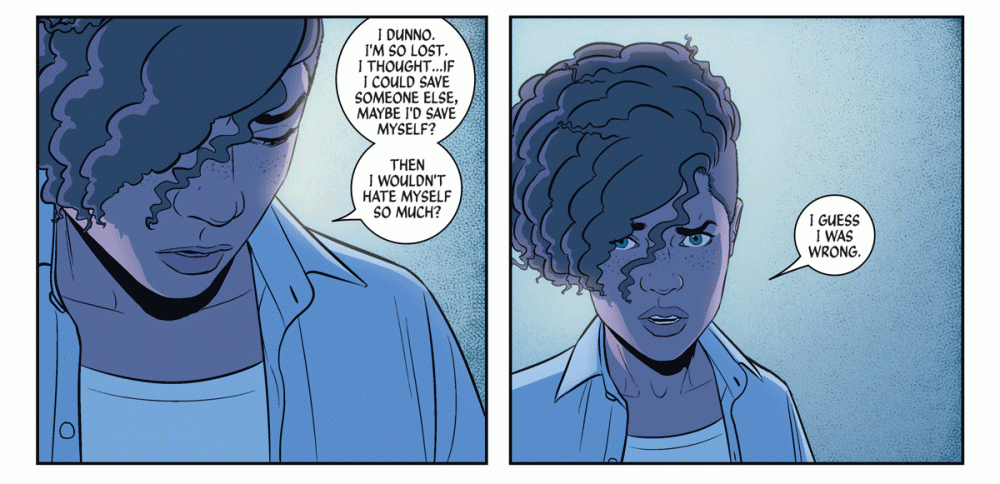
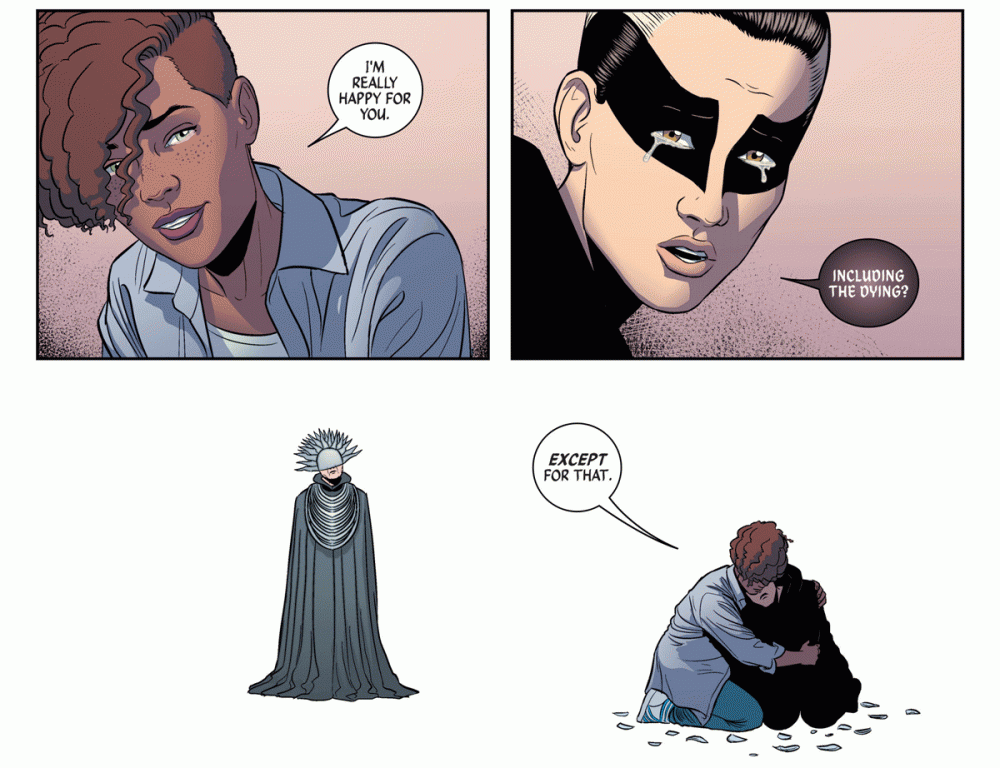
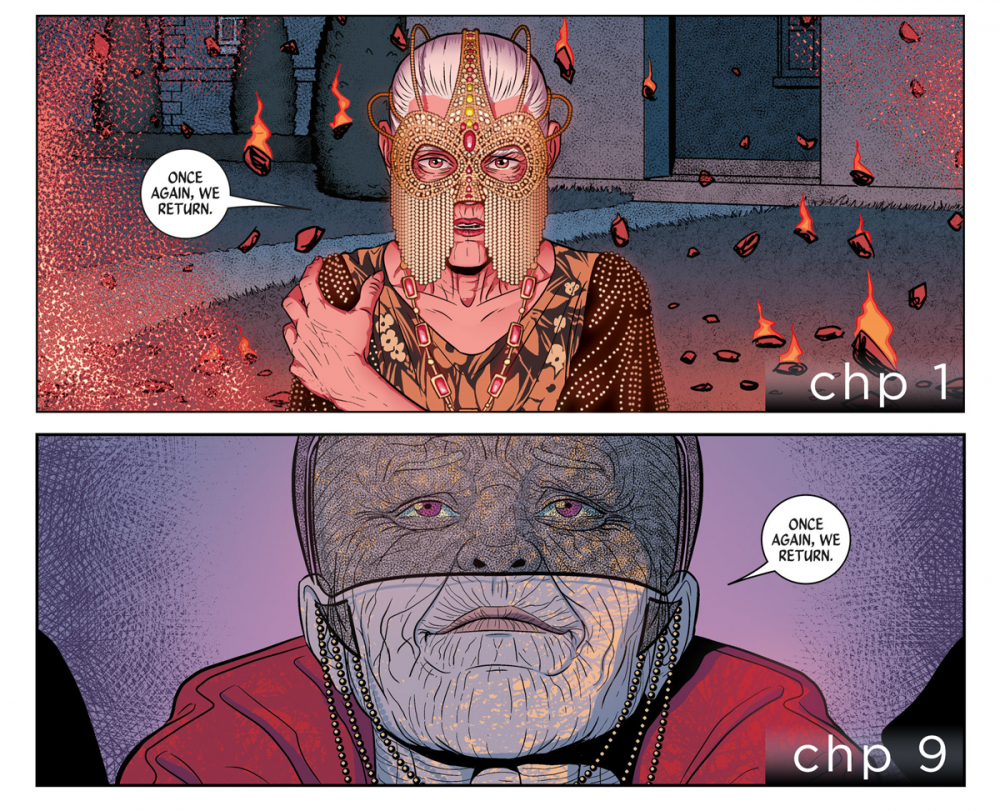
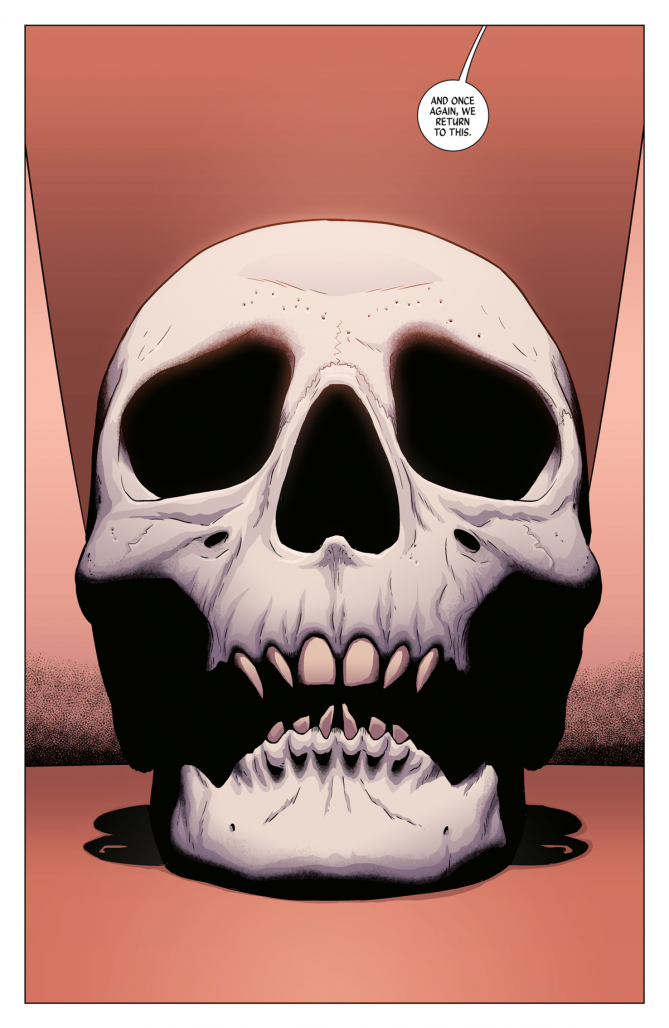
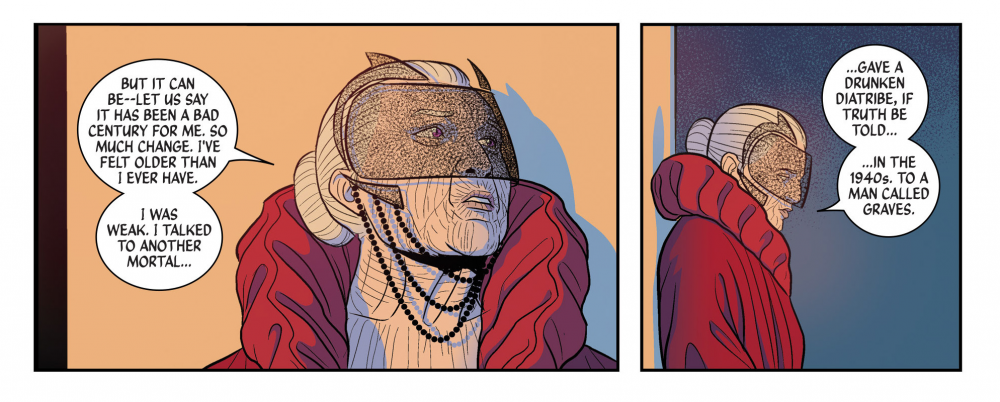
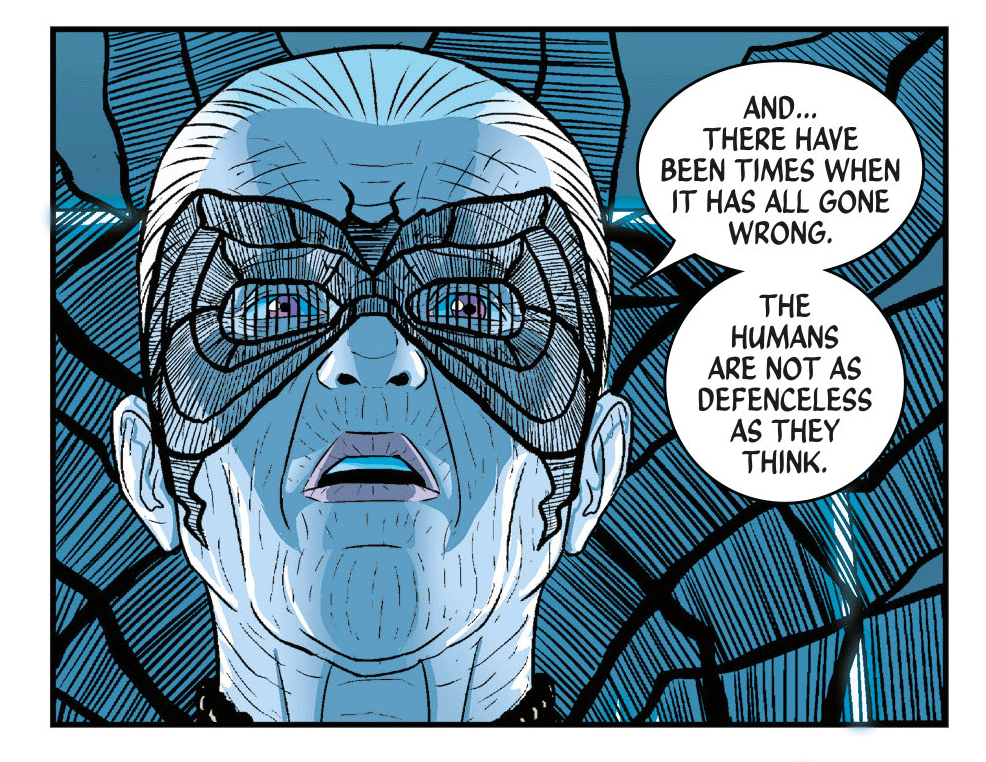
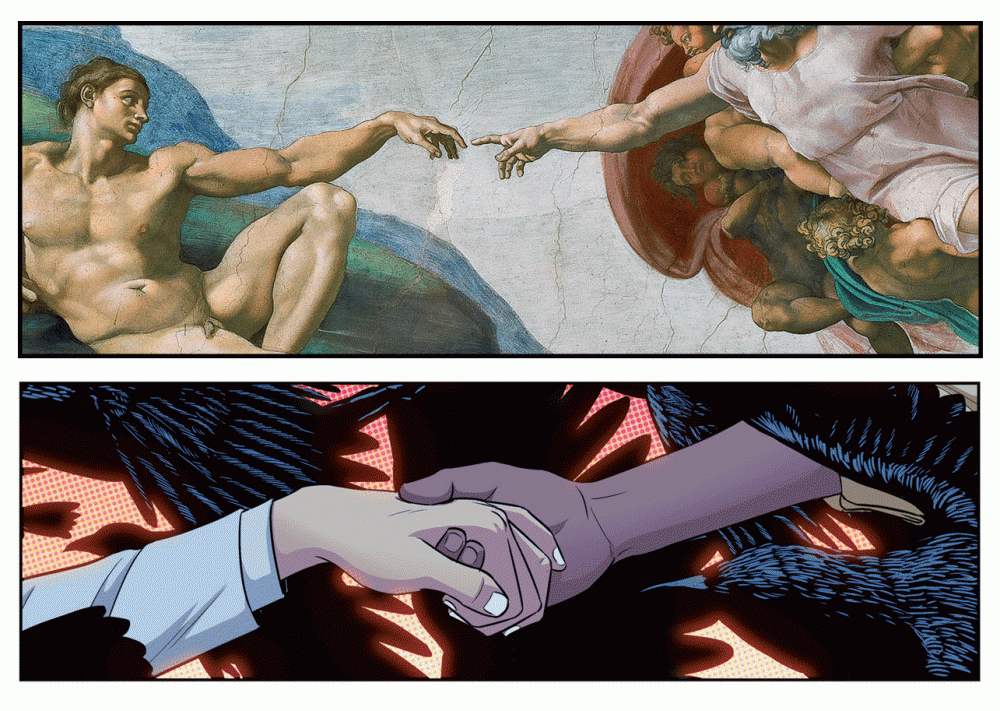
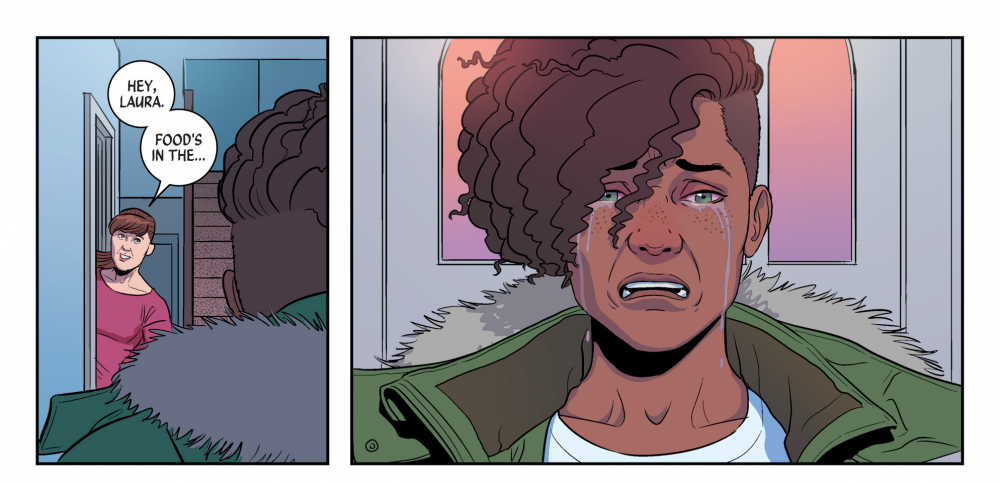
A small note, but I think you’re wrong about Luci killing the judge. The snap shows that her hand is closed, without a pointed finger. It shouldn’t therefore have had any direction, any motive force or vector. All the other instances — certainly in your mirrored example from chapter 5 — the pointer finger is the vector. If Luci did kill the judge, it really would have been a cosmic accident and not her intent. And I can’t believe that there would be so much subsequent investigation as to who really did it for it all to be a red herring. I hope I’m not wrong.